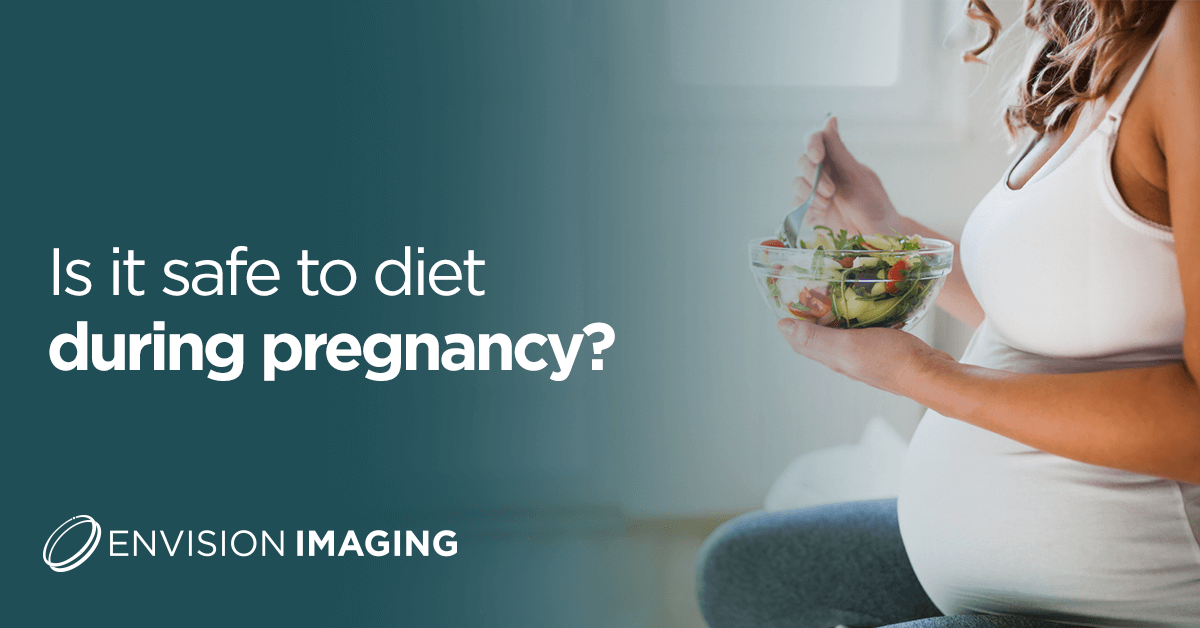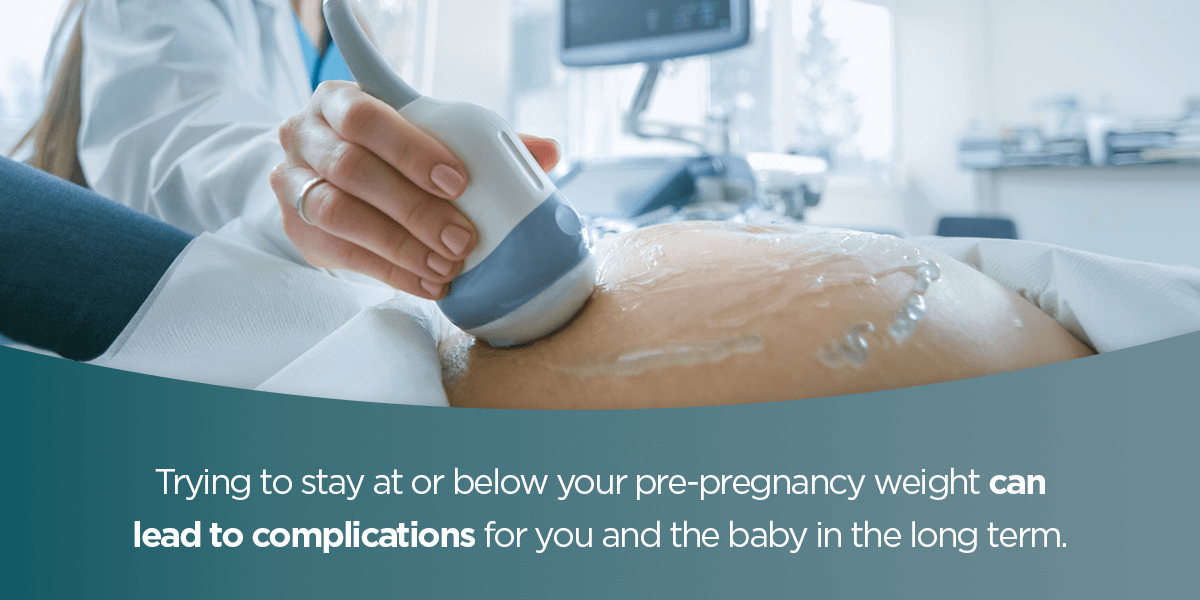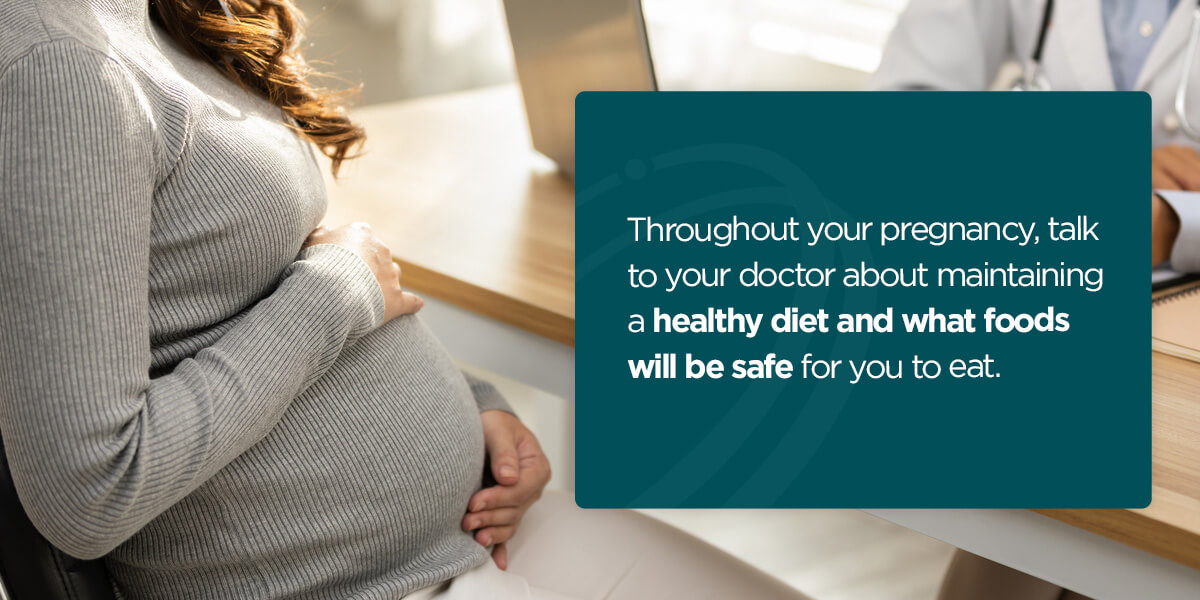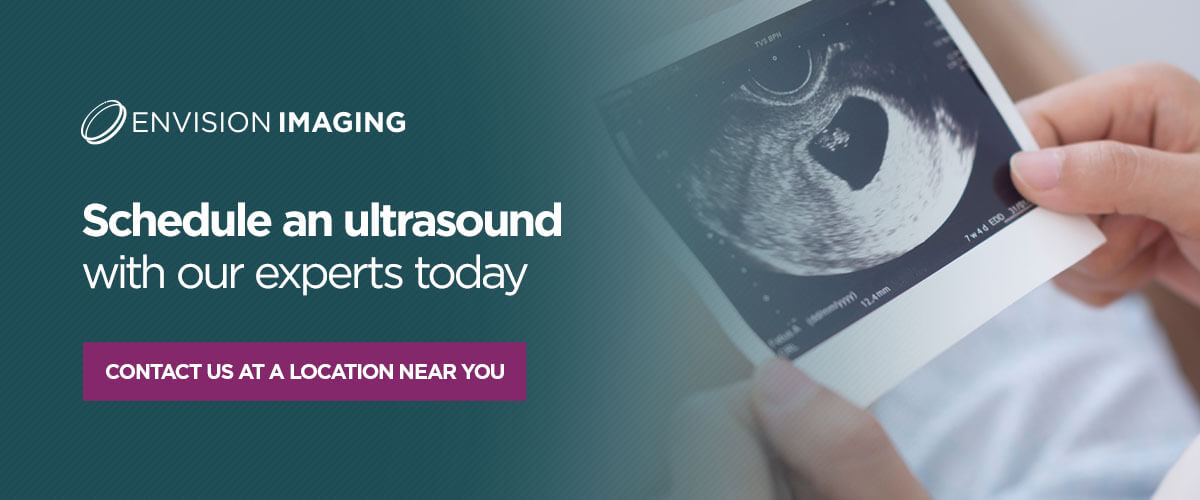Is it safe to diet during pregnancy?

In short, no — restrictive dieting is not safe when pregnant. While many of us can be tempted to eat less while pregnant to limit overall weight gain, this strategy can be very dangerous for you and your baby’s health. Instead, it’s best to eat a healthy balance of foods to provide your baby and your body with the nutrients they need.
How pregnancy affects hunger
Morning sickness and a lack of appetite in the first trimester are common due to several factors, including fatigue, blood pressure fluctuations and hormonal changes. As a result, your hunger can increase in the second and third trimesters, leading to cravings and mindless eating.
Psychological and behavioral changes caused by increased hormones — specifically estrogen and progesterone — can affect tastebuds. You may randomly crave foods you usually dislike or find your favorite foods repulsive. You may even have a frequent sour or metallic taste in your mouth, even if you haven’t eaten anything for a while.
The way your baby is positioned can also impact your hunger. For example, the baby can put more weight on your stomach and make you feel full.
The long-term effects of dieting during pregnancy

While it’s a good idea to maintain a healthy weight during pregnancy, you should not go on a diet if pregnant. Remember that some weight gain is normal with pregnancy. Trying to stay at or below your pre-pregnancy weight can lead to complications for you and the baby in the long term, including:
- Birth complications: A diet with low nutrients can affect your baby’s development. A small for gestational age (SGA) classification can potentially lead to miscarriage or preterm birth — and without the right nutrients, you may not have the proper strength for labor.
- Metabolic disease: Infants born SGA are at a higher risk of developing metabolic disease later in life because these children often experience rapid catch-up growth after birth. Accelerated postnatal weight gain can also increase the risk of insulin resistance and adiposity.
- Neuropsychiatric disorders: Decreased nutrition intake during pregnancy can lead to brain defects, increasing the risk of neuropsychiatric disorders. Underdeveloped brains can also lead to abnormal behaviors, visual impairments and motor deficits.
- Postpartum complications: Malnourishment during pregnancy may lead to postpartum complications, including muscle pain, nausea and food aversions while healing. A lack of nutrients can also contribute to lactation issues, resulting in breast milk transferring less nourishment to your baby after birth.
Why nutrition is important during pregnancy
Nutrition is the building block of life. Eating enough is especially important during pregnancy, as proper nutrition will impact your baby’s growth and development. Even if you are having twins or triplets, the focus should be on the foods you eat — not necessarily the amount.
While you may need to increase your calorie intake as your baby grows during the second and third trimesters, the required addition is usually only 400 to 600 calories. Be sure to talk to your doctor about your specific dietary needs.
Adding nutrient-dense foods to your diet can benefit both you and your baby. Some of the most recommended nutrients to add to your diet include:
- Folate: Folate is a nutrient that is integral to red blood cell formation and prevents neural tube defects (NTD) during early pregnancy. It can be found naturally in foods like dark leafy greens. Folic acid is the synthetic version of this nutrient found in supplements.
- Choline: Choline promotes brain development, tissue expansion and neurotransmission, benefiting you and your growing baby. It can also prevent congenital disabilities. You can find it in many protein sources.
- Calcium: Calcium is essential to strengthen your and your baby’s bones and teeth. Additionally, calcium can help your baby develop a healthy heart, nerves and muscles. Dairy products are the primary source of calcium.
- Omega-3: Consuming omega-3 fatty acids during pregnancy can help your baby’s brain and eyes develop. It also reduces the risk of preterm birth and postpartum depression. A few common sources of omega-3s are fish, chia seeds and soybeans.
- Iron: Iron in a diet will reduce the risk of anemia, low birth weight and iron deficiency. The volume of blood in the body increases during pregnancy. Your body will need iron to make this additional blood and supply more oxygen to your baby.
- Vitamin D: Vitamin D is essential during pregnancy to help grow your baby’s bones, teeth, kidneys, heart and nervous system. A small amount of vitamin D comes from diet, but the sun is the primary source of this nutrient.
- Vitamin B12: Vitamin B12 develops your baby’s brain and nervous system. It is also needed to absorb folate and choline into your bloodstream.
What is safe to eat during pregnancy?
Eating a balanced diet means consuming a variety of food groups. In general, it’s best to stay away from foods high in fat, sugar, caffeine and mercury. Eating too much of these food groups can increase your cholesterol and blood pressure, which can cause complications during pregnancy.
Most people take a prenatal supplement during pregnancy, which is helpful. Just remember that a supplement is not a meal replacement — instead, it’s designed to add to the nutrients you consume in your diet. Here are some of the top foods to incorporate into your diet to get the nutrients listed above, especially while pregnant.
Fruits and vegetables
Various fruits and vegetables are rich in vitamins and minerals. They also offer fiber, which is a key nutrient for combating constipation. Eat at least five portions of your choice of fruit and vegetables daily, whether fresh, frozen, canned, dried or juiced. Be sure to safely prep your fresh fruits and vegetables by washing them properly before consuming them.
You can incorporate some of these fruits and vegetables into your diet as a part of your meals or as regular snacks:
- Oranges for vitamin C and folate
- Bananas for folate and potassium
- Dark leafy greens — such as kale and spinach — for folate and iron
- Broccoli for folate, choline, calcium and iron
- Mushrooms for choline
Carbohydrates
Starchy foods — or carbohydrates — are a great source of energy. Carbohydrates contain lots of vitamins and fiber. Eating at least 175 grams of carbohydrates as a part of a balanced daily diet should help you feel full without overeating.
Bread, rice, potatoes, pasta, oats and cornmeal are all options that should make up a third of your meal. However, it’s best to avoid refined carbohydrates and opt for whole-grain or higher-fiber options.
Protein
Protein is an essential building block in tissue and muscle growth. Experts suggest eating an average of 46 grams of protein daily during the first trimester and 71 grams daily during the second and third trimesters.
When choosing meat as your protein source, go for lean options and make sure they are cooked thoroughly. When preparing red meat, cook out the pink and ensure no pink or red juices remain. Undercooked meat can carry parasites or bacteria that can harm you and your baby.
Some familiar sources of protein to lean on during pregnancy include:
- Beans, such as kidney beans and black beans
- Meat, including beef and pork
- Cooked eggs
- Poultry, including chicken and turkey
- Nuts, including almonds, cashews, pistachios and pecans
Dairy
Milk, cheese and yogurt contain calcium and other important nutrients for your baby’s growth. Choose low-fat varieties, such as skim or 1% milk. If you are lactose intolerant or prefer not to consume lactose, lean more toward unsweetened, calcium-dense alternatives.
Pregnancy diets to avoid

Crash dieting while pregnant can be dangerous for you and your baby. Throughout your pregnancy, you will want to talk to your doctor about maintaining a healthy diet and what foods will be safe for you to eat.
Certain foods can cause complications during and after pregnancy. In general, you should avoid:
- Seafood with high mercury content: High levels of mercury — often found in seafood — can harm a baby’s brain and nervous system development. While some fish is recommended in your diet for the omega-3 fatty acids, a few varieties you should avoid include bigeye tuna, swordfish, mackerel, shark and tilefish.
- Undercooked seafood, meat or poultry: Raw or undercooked meat may carry parasites or harmful bacteria that can get you sick or stunt your baby’s growth. Pregnancy suppresses the immune system, leaving you more vulnerable than before.
- Unpasteurized foods: Raw milk and unpasteurized cheeses may also carry bacteria that can cause an infection with harmful consequences for your baby. Avoid soft cheeses like brie, queso, camembert and chevre and some blue-veined cheeses like feta, ricotta and mozzarella.
- Deli meat: Heavily processed meats, such as hot dogs, deli meat and pepperoni, can carry bacteria from processing and storage. These meats are also made with high amounts of sodium, which can increase your blood pressure and potential for complications.
- Caffeine: While caffeine can be consumed in small, infrequent doses during pregnancy, it’s best to avoid it as much as possible. Caffeine is absorbed quickly in the body and can pass into the placenta. Your baby does not yet have the enzyme to metabolize caffeine quickly, so high levels can build up.
- Unfiltered water: Most tap water in the United States is safe to drink, but contaminated water can harm you and your baby. To be safe, invest in a quality water filter pitcher or sink attachment.
Additional methods to stay healthy while pregnant
Steady weight gain is normal during pregnancy. However, rapid weight gain early on can increase the risk of gestational diabetes and high blood sugar levels.
Maintaining a healthy weight is extremely beneficial for both you and your baby. Discuss with your doctor what a healthy weight would look like for your specific circumstances.
In addition to choosing more whole-food options, here are some ways to stay healthy while you are pregnant.
Continue to hydrate
Proper hydration is more important than ever when you are pregnant. The water in your body will support your growing baby, increasing your blood volume and amniotic fluid. Fluids can also help you better absorb nutrients from the foods you eat and transfer them to your baby.
To stay hydrated while pregnant, be sure to:
- Drink enough water: The recommended daily water intake while pregnant is 64 to 96 ounces. The exact amount you should consume can fluctuate depending on your body weight, so ask your doctor what amount is right for you.
- Eat water-based foods: Eating water-rich foods can also help you stay hydrated throughout the day. Fresh fruits and vegetables are excellent sources of water and nutrients.
- Increase fluid intake when active: When you exercise or spend time outside on a hot day, increase your fluid intake. You can do so by consuming fluids other than water, including milk, juice, sparkling water and broth from soups. Steer clear of soda, coffee and caffeinated teas, as these can dehydrate you.
- Add electrolytes: Electrolytes are nutrients that carry an electric charge and are dissolved in blood or water. Incorporating electrolytes into your fluids can increase your ability to absorb water and better hydrate your body. To increase your electrolytes, you can add sea salt to your water, drink coconut water or buy electrolyte packets at your grocery store.
Get mild to moderate exercise
A common myth during pregnancy is that all exercise can be harmful to your baby. In reality, staying strong through exercise is extremely beneficial for your body while pregnant. It can help you maintain a healthy weight, reduce the risk of developmental issues, and ease aches and pains during labor.
Doctors recommend the same amount of exercise during and outside of pregnancy — 30 to 60 minutes, three to five times a week. You can take this slowly, especially if you did not regularly exercise before you became pregnant.
Some of the best forms of exercise while pregnant include:
- Swimming: Swimming is a low-impact exercise that reduces weight on your joints while working your whole body.
- Walking: Walking stimulates blood circulation and is easy on your joints and muscles, especially if you are just starting to exercise more.
- Yoga: Yoga is relaxing and can help you strengthen your muscles and balance. Be sure to find modified poses that accommodate pregnancy. You should also avoid laying on your back for long periods.
Why trust us?
Envision Imaging is a leader in the radiology industry, paving the way for efficient services and accurate results. You can trust us because of our:
- Extensive experience: The Envision Imaging team is carefully selected and committed to professional development. We are some of the most qualified and experienced experts in this constantly evolving field.
- Advanced technology: As radiology continues to evolve, we update and train our team on the most up-to-date services. This practice ensures our advanced diagnostic imaging technology offers accurate and reliable results.
- Fast results: We offer one of the fastest turnaround rates in the industry. Your doctor can receive your images on the same day as your appointment.
- Friendly atmosphere: When you walk through our doors, you are treated like family. Our team is passionate about providing you with a comfortable imaging experience.
Schedule an ultrasound with our experts today
Pregnancy is an exciting moment in life, and you can witness the fruit of your safe eating efforts during regular ultrasound appointments. Envision Imaging offers ultrasound imaging services to help monitor your baby’s growth.
We are proud to serve communities across Colorado. For more information, contact us at a location near you.



